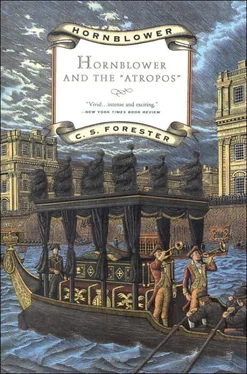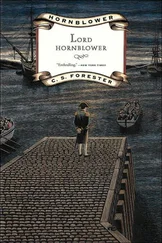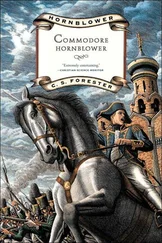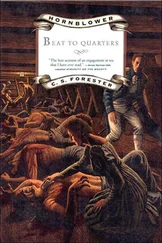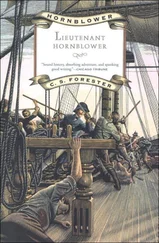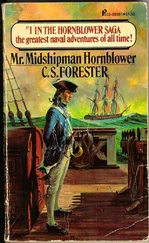There was still plenty of daylight when they came out into the Thames valley and Hornblower, looking down to starboard, could see the infant river—not such an infant at its winter level—running below. Every turn and every lock brought the canal nearer to the stream, and at last they reached Inglesham, with Lechlade church steeple in view ahead, and the junction with the river. At Inglesham lock Jenkins left his horses and came back to speak to Hornblower.
“There’s three staunches on the river next that we have to run, sir,” he said.
Hornblower had no idea what a staunch was, and he very much wanted to know before he had to “run” them, but at the same time he did not want to admit ignorance. Jenkins may have been tactful enough to sense his difficulty; at least he gave an explanation.
“They’re dams across the river, sir,” he told Hornblower. “At this time o’ year, with plenty of water, some o’ the paddles are kept out for good, at the towpath end o’ the staunch. There’s a fall o’ five or six feet.”
“Five or six feet?” repeated Hornblower, startled.
“Yes, sir. ‘Bout that much. But it isn’t a real fall, if you know what I mean, sir. Steep, but no more.”
“And we have to run down it?”
“Yes, sir. It’s easy enough sir—at the top, leastways.”
“And at the bottom?”
“There’s an eddy there, sir, like as you’d expect. But if you hold her straight, sir, the nags’ll take you through.”
“I’ll hold her straight,” said Hornblower.
“O’ course you will, sir.”
“But what the devil do they have these staunches on the river for?”
“They keeps back the water for the mills—an’ the navigation, sir.”
“But why don’t they have locks?”
Jenkins spread his hand and his hock in a gesture of ignorance.
“Dunno, sir. There’s locks from Oxford down. These ‘ere staunches are a plague. Takes six horses to get the old Queen Charlotte up ‘em, sometimes.”
Hornblower’s thinking about the subject had not get progressed as far as thinking about how the staunches were passed upriver; and he was a little annoyed with himself at not having raised the point. But he managed to nod sagely at the information.
“I daresay,” he said. “Well, it doesn’t concern us this voyage.”
“No, sir,” said Jenkins. He pointed down the canal. “The first ‘un is half a mile below Lechlade Bridge, there. It’s well over on the port side. You can’t miss it, sir.”
Hornblower hoped he was right about that. He took his place in the stern and seized the tiller with a bold attempt to conceal his misgivings, and he waved to the lockkeeper as the boat moved rapidly out of the lock—he was adept enough by now to be able to spare attention for that even with a gate to negotiate. They shot out on to the surface of the young river; there was plenty of current running in their direction—Hornblower noted the eddy at the point—but the speed of the horses gave them plenty of steerageway.
Lechlade Bridge just ahead of them—the staunch was half a mile beyond, Jenkins said. Although the air was distinctly cold now Hornblower was conscious that his palms, as they rested on the tiller, were distinctly damp. To him now it appeared a wildly reckless thing to do, to attempt to shoot the staunch inexperienced as he was. He would prefer—infinitely prefer—not to try. But he had to steer through the arch of the bridge—the horses splashed fetlock deep there—and then it was too late to do anything about his change of mind. There was the line of the staunch across the stream, the gap in it plainly visible on the port side. Beyond the staunch the surface of the river was not visible because of the drop, but above the gap the water headed down in a steep, sleek slope, higher at the sides than in the middle; the fragments which floated on the surface were all hurrying towards it, like people in a public hall all pressing towards a single exit. Hornblower steered for the centre of the gap, choking a little with excitement; he could feel the altered trim of the boat as her bows sank and her stern rose on the slope. Now they were flying down, down. Below, the smooth slope narrowed down to a point, beyond which and on each side was the turbulent water of the eddy. He still had steerage way enough to steer down the point; as he felt the boat answer the helm he was momentarily tempted to follow up the mathematical line of thought presented by that situation, but he had neither time nor really the inclination. The bows hit the turbulent water with a jar and a splash; the boat lurched in the eddy, but next moment the towlines plucked them forward again. Two seconds’ careful steering and they were through the eddy and they were gliding over a smooth surface once more, foamstreaked but smooth, and Hornblower was laughing out loud. It had been simple, but so exhilarating that it did not occur to him to condemn himself for his earlier misgivings. Jenkins looked back, turning in his saddle, and waved his whip, and Hornblower waved back.
“Horatio, you must come and have your dinner,” said Maria. “And you have left me alone all day.”
“Not long before we reach Oxford now, dear,” said Hornblower—he was just able to conceal the fact that he had temporarily, until then, forgotten the existence of his wife and child.
“Horatio—”
“In a little while, dear,” said Hornblower.
The winter evening was closing round them, the light mellowing while it faded over ploughland and meadow, over the Pollard willows knee-deep in the stream, over the farmhouses and cottages. It was all very lovely; Hornblower had the feeling that he did not want this moment ever to end. This was happiness, as his earlier feelings of wellbeing changed to something more peaceful, just as the surface of the river had changed below the eddy. Soon he would be back in another life again, plunged once more into a world of cruelty and war—the world he had left behind in the tidewater of the Severn and would meet again in the tidewater of the Thames. It was symbolic that it should be here in the centre of England, at the midpoint of his journey, that he should reach this momentary summit of happiness. The cattle in the fields, the rooks in the trees—were they part of this happiness? Possibly, but not certainly. The happiness came from within him, and depended on even more transitory factors than those. Hornblower breathed the evening air as though it were divine poetry, and then he noticed Jenkins waving to him from his saddle and pointing with his whip, and the moment was over, lost for ever.
That was the next staunch at which Jenkins was pointing. Hornblower steered boldly for it, without a moment of nervousness; he steadied the boat on her course above it, felt the heave and sudden acceleration as she topped the slope, and grinned with delight as she shot down it, hit the eddy below, and emerged as before after a brief period of indecision. Onward, down the river, through the gathering night. Bridges; another staunch—Hornblower was glad it was the last; there had been much point to what Jenkins had said about needing daylight in which to run them—villages, churches. Now it was quite dark, and he was cold and weary. The next time Maria came aft to him he could address her sympathetically, and even share her indignation that Oxford was so far away. Jenkins had lighted candlelanterns; one hung on the collar of the lead horse and the other from the cantle of the saddle of the horse he rode. Hornblower, in the stern sheets of the Queen Charlotte , saw the specks of light dancing on the towpath—they gave him an indication of the turns the river was making, and just enabled him to steer a safe course, although twice his heart was in his mouth as the side of the boat brushed against the reeds at the river bank. It was quite dark when Hornblower felt the boat slow up suddenly with the easing of the towlines, and in response to Jenkins’ quiet hail he steered the boat towards a lanternlit landingstage; ready hands took the lines and moored the boat, and the passengers began to swarm out.
Читать дальше
